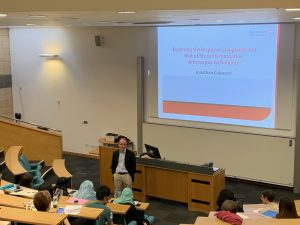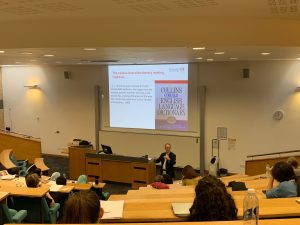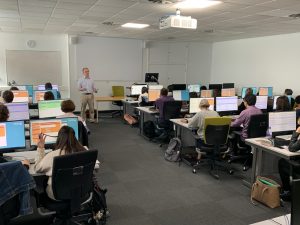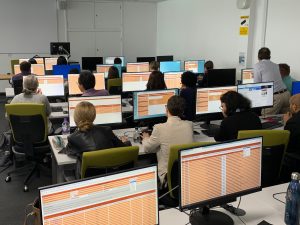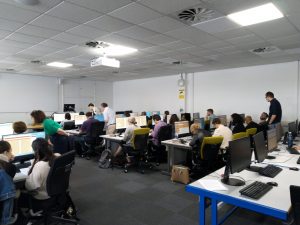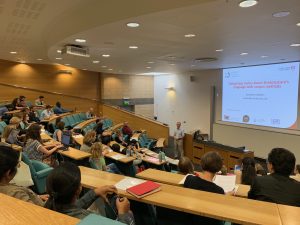
The Encyclopedia of Shakespeare’s Language Project Summer School
…or, how we did it, and how you can learn to do it.
Lancaster University, UK
lancaster.ac.uk/corpussummerschools
If you have browsed the other pages in this website, it is probably already clear that the Encyclopedia of Shakespeare’s Language project is underpinned by corpus-based methods. It is a case of Corpus Linguistics meets Shakespeare.
Corpus Linguistics is a branch of linguistics that is focused on method, typically involving computers looking for patterns in vast electronic text-banks or corpora. If that sounds alien, it is worth noting that some of the enterprises within Digital Humanities deploy similar techniques, and the same can be said of authorship attribution studies. In fact, the recent (controversial!) decision to attribute some of Shakespeare’s plays formerly thought of as entirely written by Shakespeare to Christopher Marlowe was based on analyses using techniques that are familiar to the world of Corpus Linguistics.
However, there is a difference. Corpus linguistics is centrally focused on patterns of meaning; the same could not be said of author attribution studies. For example, in the project, we look at the words Welsh, Irish and Scottish. We are not simply interested in the number of times these words occur, but in the words they occur with, and how those co-occurrences may colour the meanings of those items (e.g. Irish, not unexpectedly, co-occurs frequently with negative words such as wild and savage, but unexpectedly with rug, something that points to a positive feature — an Irish rug was a well-regarded colonial import).
The Summer School is free-of-charge, though you will need to bear the costs of your travel and accommodation. The programme consists of a series of lectures, discussion-oriented sessions, and practical sessions in computer labs where participants are trained in the use of corpus tools. No background in corpus linguistics is needed, though basic computing skills are assumed (which most people have these days anyway). An indicative topic list is as follows:
- Building and analysing corpora
- Foundational techniques: concordance analysis
- Collocation analysis and data visualisation
- Statistics in corpus analysis
- Corpus-based discourse analysis
- Studying social history with coprora
- Exploring Shakespeare’s language with corpus techniques
- A plenary lecture on Shakespeare’s language
Note that in the practical hands-on sessions relating to the first set of bullet points above, you will typically be working with texts relating to Shakespeare and/or his contemporaries.
The Encyclopedia project’s summer school is a thread embedded within the Language, Discourse, and Society strand of the Lancaster Summer Schools in Corpus Linguistics. This Shakespeare thread has been running for the past three years, with participants joining us from right across the globe.
Hear about what some of our participants thought about the Summer School by reading these blog posts, and get a taster by watching a lecture from Prof. Jonathan Culpeper below.
- Summer School Reflections, Claire McGann
- Writing tips from Shakespeare – Lancaster’s language detectives, Jules Horne
- Tweets from 2017
For more details and for more information, click here.

